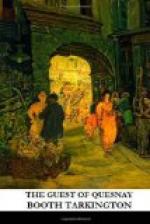“But I wish to ask him her name,” urged the other, with something curiously like the obstinacy of a child. “I wish—”
“No, no!” Keredec took him by the arm. “We must go. We shall be late for our dinner.”
“But why?” persisted the young man.
“Not now!” The professor removed his broad felt hat and hurriedly wiped his vast and steaming brow—a magnificent structure, corniced, at this moment, with anxiety. “It is better if we do not discuss it now.”
“But I might not meet him again.”
Professor Keredec turned toward me with a half-desperate, half-apologetic laugh which was like the rumbling of heavy wagons over a block pavement; and in his flustered face I thought I read a signal of genuine distress.
“I do not know the lady,” I said with some sharpness. “I have never seen her until this afternoon.”
Upon this “that other monsieur” astonished me in good earnest. Searching my eyes eagerly with his clear, inquisitive gaze, he took a step toward me and said:
“You are sure you are telling the truth?”
The professor uttered an exclamation of horror, sprang forward, and clutched his friend’s arm again. “Malheureux!” he cried, and then to me: “Sir, you will give him pardon if you can? He has no meaning to be rude.”
“Rude?” The young man’s voice showed both astonishment and pain. “Was that rude? I didn’t know. I didn’t mean to be rude, God knows! Ah,” he said sadly, “I do nothing but make mistakes. I hope you will forgive me.”
He lifted his hand as if in appeal, and let it drop to his side; and in the action, as well as in the tone of his voice and his attitude of contrition, there was something that reached me suddenly, with the touch of pathos.
“Never mind,” I said. “I am only sorry that it was the truth.”
“Thank you,” he said, and turned humbly to Keredec.
“Ha, that is better!” shouted the great man, apparently relieved of a vast weight. “We shall go home now and eat a good dinner. But first—” his silver-rimmed spectacles twinkled upon me, and he bent his Brobdingnagian back in a bow which against my will reminded me of the curtseys performed by Orloff’s dancing bears—“first let me speak some words for myself. My dear sir”—he addressed himself to me with grave formality—“do not suppose I have no realization that other excuses should be made to you. Believe me, they shall be. It is now that I see it is fortunate for us that you are our fellow-innsman at Les Trois Pigeons.”
I was unable to resist the opportunity, and, affecting considerable surprise, interrupted him with the apparently guileless query:
“Why, how did you know that?”
Professor Keredec’s laughter rumbled again, growing deeper and louder till it reverberated in the woods and a hundred hale old trees laughed back at him.
“Ho, ho, ho!” he shouted. “But you shall not take me for a window-curtain spy! That is a fine reputation I give myself with you! Ho, ho!”




